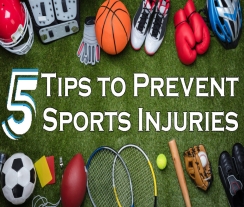All sports have a risk of injury.
However, here are some important injury prevention tips that can help promote a safe, optimal, sports experience for you and your athletes.
1. Get a Pre-Season Physical
A pre-season physical is a great way of identifying if your athlete is fit to play. Sports physicals help identify areas of concern before the athlete starts the season. Most schools require that players obtain a physical at least once every two years.
2. Know the Importance of Warming-Up & Proper Technique
You’ve heard this before, with any activity, it’s critical that players warm-up and stretch their muscles before AND after exercising or playing a sport. In every sport, there is a right and wrong way of doing things; in football, there is a proper way of tackling, in soccer, there is a proper technique for heading the ball, and in overhead sports there is the right way to throw/pitch. Following these guidelines is crucial to maintaining your health and staying in motion.
3. Recognizes Signs of Injury & Get Help Early
It’s tempting to brush off minor symptoms, but these are often some warning signs you should never neglect. Athletes often alter the way they do things because of pain, but if they don’t rest or get help early, it can turn into a more serious injury. Do you notice your player limping while running, rubbing a leg during play, or throwing differently? Don’t ignore these signs, pull them out of play, and get them seen by a specialist.
4. Ensure a Healthy, Well-Balanced Diet & Proper Hydration
Eating a well-balanced diet with plenty of fruits, vegetables, and lean proteins. Additionally, maintaining a consistent eating schedule to promote proper digestion is very important for athletes. If there is extra importance placed on weight such as in wrestling, it’s critical that the athletes follow safe eating habits. Equally as important is ensuring proper hydration as heat-related illness is a major concern for athletes. Ensure the player consumes enough water before, during, and after play and watch for signs of dehydration.
5. Participate in Different Activities to Cross-Train Your Body
Cross-training can help condition the entire body and raise overall fitness levels. It’s important for athletes to change up the sports or activities they are doing so they are not continuously putting stress on the same muscles and joints to avoid overuse injuries. There are countless ways to cross-train, but the important aspect is that athletes should vary their training to target different muscle groups.
Did You Know?
Orthopedic + Fracture Specialists is proud to work with a number of High Schools and Club Teams in the Portland Metro Area.

